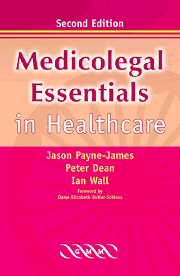Book contents
- Frontmatter
- Contents
- Contributors
- Editors' note for the first edition
- Editors' note for the second edition
- Foreword
- Table of statutes
- Table of cases
- 1 Legal institutions and the legal process
- 2 Human rights and healthcare professionals
- 3 Medical ethics and the forensic physician
- 4 Confidentiality
- 5 Consent to medical treatment
- 6 Professional bodies and discipline
- 7 Complaints in the National Health Service
- 8 The Mental Health Act (England and Wales)
- 9 Death certification and the role of the coroner
- 10 Tissues and organs
- 11 Organ donation
- 12 Living wills
- 13 Euthanasia and end-of-life decision-making
- 14 Abortion and reproductive health
- 15 The Children Act 1989
- 16 Clinical negligence
- 17 Legislation for medicines and product liability
- 18 Clinical trials: ethical, legal and practical considerations
- 19 Medicolegal implications of blood-borne viruses
- 20 Healthcare professionals in court – professional and expert witnesses
- Index
18 - Clinical trials: ethical, legal and practical considerations
Published online by Cambridge University Press: 12 January 2010
- Frontmatter
- Contents
- Contributors
- Editors' note for the first edition
- Editors' note for the second edition
- Foreword
- Table of statutes
- Table of cases
- 1 Legal institutions and the legal process
- 2 Human rights and healthcare professionals
- 3 Medical ethics and the forensic physician
- 4 Confidentiality
- 5 Consent to medical treatment
- 6 Professional bodies and discipline
- 7 Complaints in the National Health Service
- 8 The Mental Health Act (England and Wales)
- 9 Death certification and the role of the coroner
- 10 Tissues and organs
- 11 Organ donation
- 12 Living wills
- 13 Euthanasia and end-of-life decision-making
- 14 Abortion and reproductive health
- 15 The Children Act 1989
- 16 Clinical negligence
- 17 Legislation for medicines and product liability
- 18 Clinical trials: ethical, legal and practical considerations
- 19 Medicolegal implications of blood-borne viruses
- 20 Healthcare professionals in court – professional and expert witnesses
- Index
Summary
INTRODUCTION
Much basic medical research is carried out in laboratories. However, new diagnostic and therapeutic measures eventually need to be tested on humans – first by studying drug delivery and toxicity in healthy volunteers, then drug efficacy and activity in a limited group of patients – Phase I and Phase II studies. Following these studies a new treatment must be tested against conventional therapy by means of the Phase III study or randomised controlled clinical trial (RCT). Finally, on-going surveillance of treatments is carried out either by individual doctors and institutions auditing results or by reporting of adverse events. For example in the UK, since 1964, doctors have been asked to report suspected adverse drug reactions to the Medical and Healthcare Regulatory Agency through a Yellow Card scheme.
This chapter will concentrate on the randomised clinical trial and examine some ethical, legal and practical considerations of conducting or participating in clinical trials.
The RCT was first developed by RA Fisher in the 1920s for agricultural research, and was introduced some 20 years later into medicine in a trial evaluating antibiotic treatment for tuberculosis. An RCT is a study in which a cohort of subjects with a defined disease is randomly allocated to one or other treatment (which may be an established versus either a new treatment, or using a placebo drug as the control) and their outcomes recorded.
- Type
- Chapter
- Information
- Medicolegal Essentials in Healthcare , pp. 193 - 202Publisher: Cambridge University PressPrint publication year: 2004

